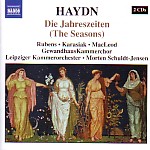There’s a lot about this performance that really is very good: the precision of the playing, the utter transparency of texture both between chorus and orchestra and within the various orchestral sections, and the lively tempos overall. It’s a stylish performance, in an antiseptic kind of way, featuring modern instruments and period practice (no news there). Conductor Morten Schuldt-Jensen contributes a rather meaningless little essay on the problems of playing old music on new instruments, and therein lies the problem. Reading it, you wish he would simply shut up and play the living daylights about of the piece, and he just doesn’t. Much of the excitement of the period-instrument movement comes from the natural balances and textures achieved by an ensemble in which the performance isn’t self-consciously shaped by a single guiding hand. In other words, dynamics and balances should be determined not by a conductor hell-bent on micro-managing every phrase, but by well-trained players working within the style. Under these circumstances, contrasts tend to be bolder, less nuanced, and dynamics more terraced and sustained. That is clearly what composers of the period expected, and their music sounds marvelous when treated that way.
The best period-instrument performances offer a certain degree of modern polish and sensitivity but still have the sense to let the music rip when it wants to, and to preserve the singing, cantabile line when it waxes lyrical. René Jacobs does just that on his recent Harmonia Mundi recording. Schuldt-Jensen, by and large, does not. The big movements–the storm scene in “Summer”, the hunt in “Autumn”, the final chorus–sound relentlessly small-scale and reined-in. By contrast, Hanne’s cavatina in “Winter” is clipped and disjointed, despite Sibylla Rubens’ appealingly pure delivery. The famous drunken chorus that concludes “Autumn” sounds safe, and not a bit tipsy, despite a wealth of captivating orchestral color in the country dance episode that immediately precedes it.
Part of the problem may stem from the small forces employed. Haydn’s The Seasons is the largest single concert work by a major composer before Berlioz–bigger even than Beethoven’s Ninth–and whether one actually uses the triple winds and hundreds of singers that Haydn wanted (alas, no one has yet done this on disc), the piece has to sound huge. Again, it does for Jacobs, and it really doesn’t here.
The soloists are generally a very good bunch, led by soprano Rubens, who is just lovely, and tenor Andreas Karasiak, who does quite well, especially in his “Winter” aria. Bass Stephen Macleod lacks heft at the low end and sounds pretty wobbly elsewhere, which is a pity because his is the larger share of all the solo work. The choir is lightweight, accurate, and utterly without character of any discernible kind. You have the sense that Schuldt-Jensen, in his zeal for “getting it right” by his own lights, has forgotten that this is music of great humanity, in which expression of the meaning of the text always must take precedence over details of phrasing and accentuation. He should listen to what Ferenc Fricsay does with the end of “Autumn” to hear how this music should sound. This is authenticity of spirit, of expression, never mind the theoretical niceties of period style. The sonics are vivid and clean, but also emphasize the small-scale nature of the performance. I wish I could enjoy this interpretation more: I respect the sheer professionalism that has clearly gone into it, but Schuldt-Jensen’s pursuit of his “concept” renders the music sterile. Coming on the heels of Naxos’ stunning, award-winning version of The Creation, this is most disappointing.
































